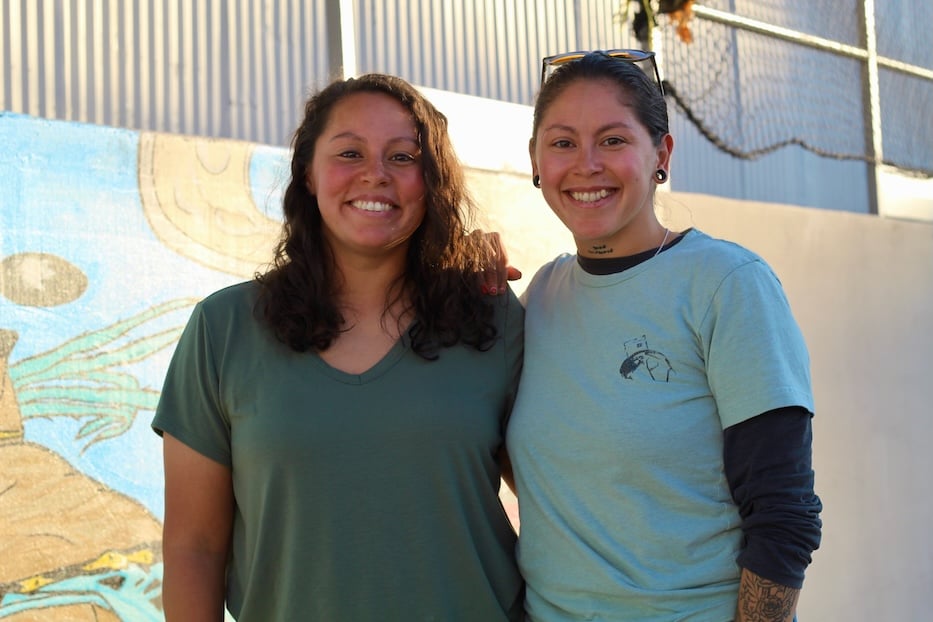
Culture & Community | Arts & Culture | West Haven
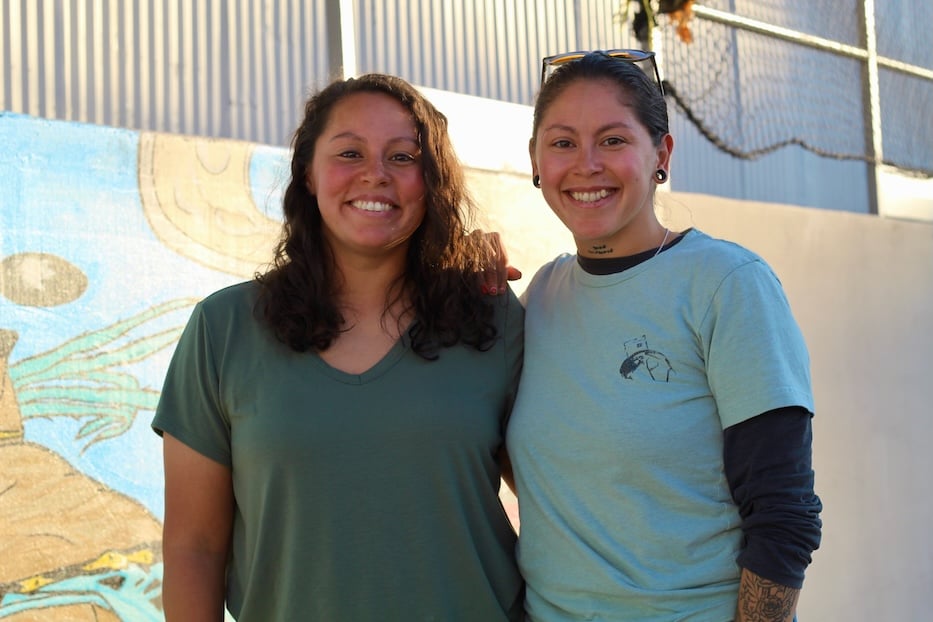
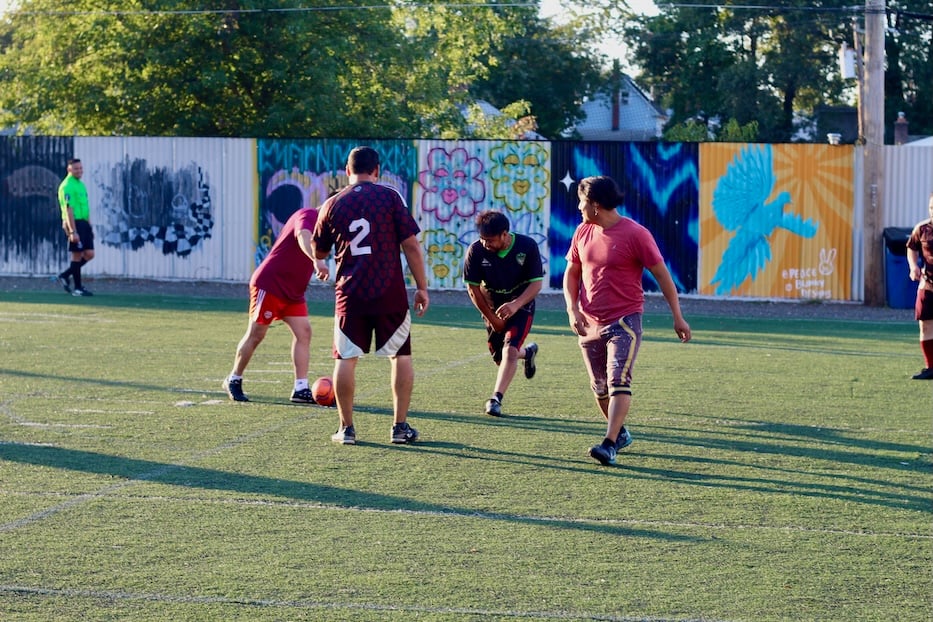
Brina and Sylvia Yanez at The Building Complex earlier this fall. Lucy Gellman File Photos.
A beloved West Haven community hub is struggling to make sense of mounting violations, unanswered calls from City Hall, noise complaints from neighbors and daily fines from the city—even as the owners work to address them promptly. Meanwhile, the mayor has said that the conflict all dates back to a divergence from an initial zoning approval that came in 2017, when the property was under a different LLC.
That hub is The Building Complex, a sports and recreational facility that sits at 150 Front Ave. in West Haven. Almost three years in—and just months after a celebratory ribbon cutting with Mayor Dorinda Borer and Council Member Gary Donovan—owners Sylvia and Brina Yanez have found themselves up against a municipal wall, fighting fees from the city even as they work to fulfill its zoning requirements.
Now, they’re hoping for clarity as they approach the building’s third birthday celebration, which includes a growing petition in support of longer hours for outdoor soccer games and events. The Building Complex will celebrate its anniversary on January 10 at 6 p.m. with “Beyond The Business: A Stand for Cultural Justice” at the space.
“We don’t feel like we’re being helped [by the city],” Sylvia Yanez said in an interview with the Arts Paper, the frustration audible in her voice. “We’re making changes and it’s clear as day that you don’t want to help us right now. I didn't expect it to be like this. They’re making it as hard as possible to move forward.”
“We are in a bit of a conundrum,” said Borer in a phone call Tuesday morning, adding that the matter is now “in the hands” of West Haven Corporation Counsel Paul Dorsi. “We want to make sure that this is a good quality of life for the neighbors, and we also want to support these young entrepreneurs, and we have to figure out the best way to do that that tries to address that.”
Zoning Enforcement Officer Steve Hotchkiss, who has been the primary point of contact for the property, did not reply to multiple phone calls and a text message requesting comment for this story. Council Member Gary Donovan, who represents the neighborhood where the complex is located, also did not reply to a request for comment.
“We’ve Just Been Trying To Be Good Neighbors”
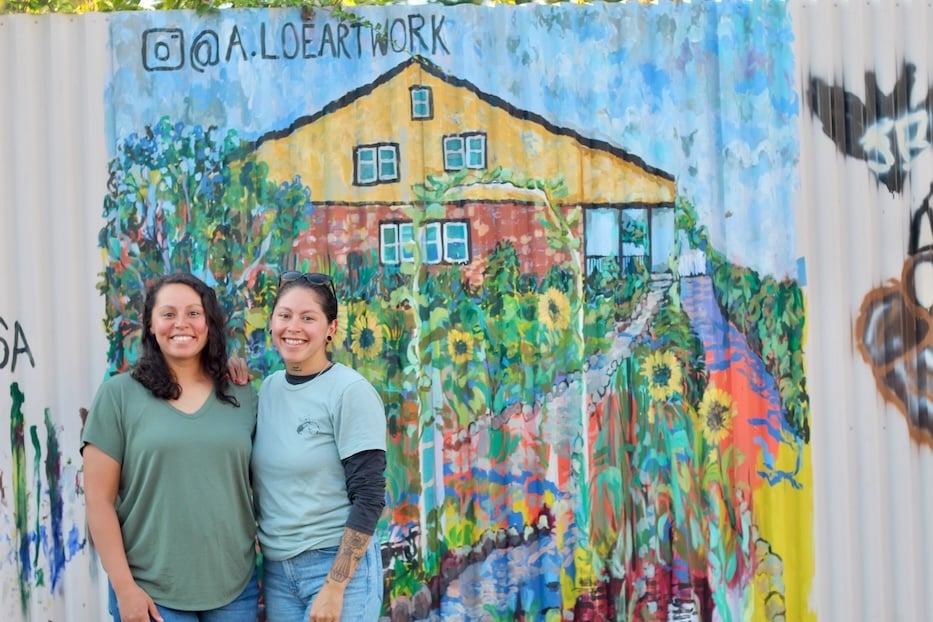
In part, to understand what’s happening is to understand the recent history of 150 Front Ave. itself, a two-and-a-half acre parcel of land that sits between Lampson Street on one side and Alling Street on the other. Around the building, the area is both residential and industrial, with two auto repair shops, a stone supplier and a rebar company all within a two-block radius.
Before the sisters owned the complex, the space belonged to Yanez’ father Victor, who has run a construction company for a little over two decades. In 2017, when it was still under the ownership of Yanez Enterprises LLC, Victor approached West Haven’s Board of Planning and Zoning with the request to build a soccer school at 150 Front Ave.
At the time, the building and land—otherwise industrial—were already home to a small 40 x 60 foot field for training games, according to minutes from that meeting. Yanez, who coached youth soccer in West Haven for nearly three decades, envisioned growing it to 80 x 108 feet, large enough for proper games. The Hawks Soccer Club, which had signed on as a tenant, planned to operate the space.
In June of that year, the measure passed. At the time, commissioners specified that the field needed to be in the front of the building, in accordance with concerns about noise from neighbors. Yanez, who had first appeared before Planning and Zoning in May, submitted a revised site plan that received approval. “The plan is now revised showing a new location of the 80 x 108 field in front of the building near Front Avenue,” read the minutes from that meeting.
But Yanez soon discovered that the front of the building wasn’t suitable for a field, due to gas and plumbing lines that made breaking ground too dangerous. The field didn’t move forward.
In that iteration, the sisters weren’t especially involved, Sylvia said: she was living in Minnesota, and Brina, a medical specialist with the Army National Guard, was actively deployed. So when “things fell through with the coach” and the facility didn’t happen, Sylvia said, they didn’t dwell on it. Victor Yanez, meanwhile, continued with his construction business, taking on a tenant on part of the property during the Covid-19 pandemic.
Then almost three years ago—after the sisters were back in Connecticut—Victor announced that he was going to be selling the site. And Brina and Sylvia, who had started dreaming of a space that could host sports games, family events, and birthday parties, offered to take it over and start a multipurpose recreational venue instead (Sylvia, herself a painter and multimedia artist, has since welcomed muralists into the space, and their bright designs now adorn its back fence).
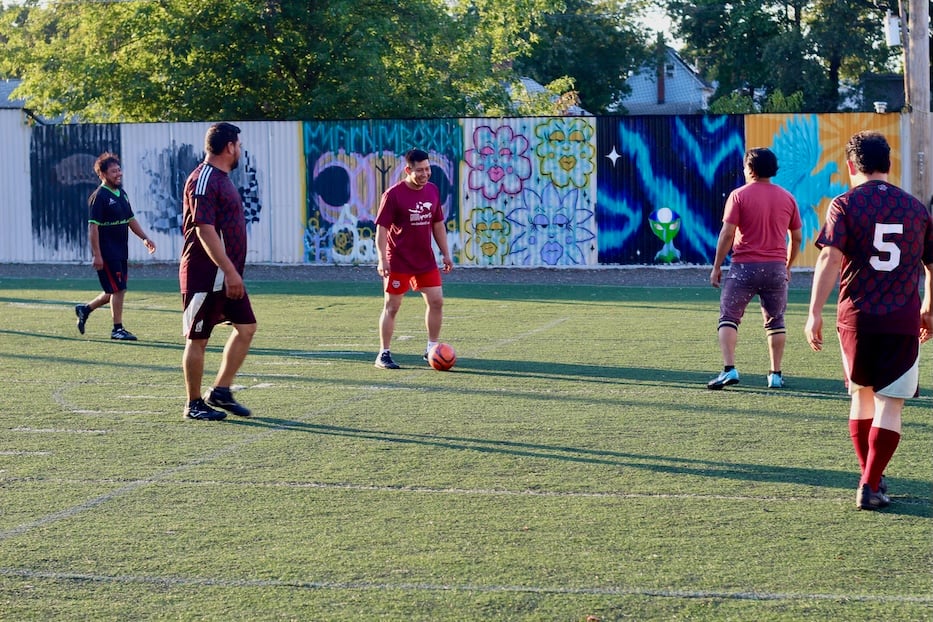
In West Haven, there are comparatively few such spaces for the community, particularly since a plan to turn the city’s armory into an arts center fell through two years ago. They were excited to get started, Sylvia remembered, so much so that “I literally went down to City Hall myself” to start inquiring about the building process. According to her records, the Department of Planning and Development showed her an earlier site plan with the field in the back of the building, and explained that the property was zoned as a recreational facility.
"I was like, 'Ok, what's a recreational facility?'" Sylvia remembered. Working together, the sisters reimagined the space, including a full turf field in the back and indoor futsal field, located on the lower level of a 3,000 square foot facility. They poured hours of labor into the building, juggling the vision with full-time work (as they still do). When they were searching for a name, they kept coming back to “The Building,” which had been the way they’d always referred to it as kids.
“Like, ‘I’m going to the building, I’ll meet you at the building,’” Brina remembered cheerily on a recent Thursday afternoon at the space. “We were like, let’s just name it that.”
The complex, as they envisioned it, could be a multi-purpose recreational facility that welcomed teams throughout the week, including for kids who had nowhere else to flex their sporty skills. They started work, reimagining the building completely (in a past life, it was the former home of the Winkle Bus Company). They fundraised, giving flight to their father’s long-held dream. When it opened, turf leagues played outside in the evening, but lights were always off by 9 p.m., Sylvia said. (She said lights are now off by 8 p.m.)
“The vision was to create a safe space for the community,” she said. “And to encourage the wellness of the whole family.”
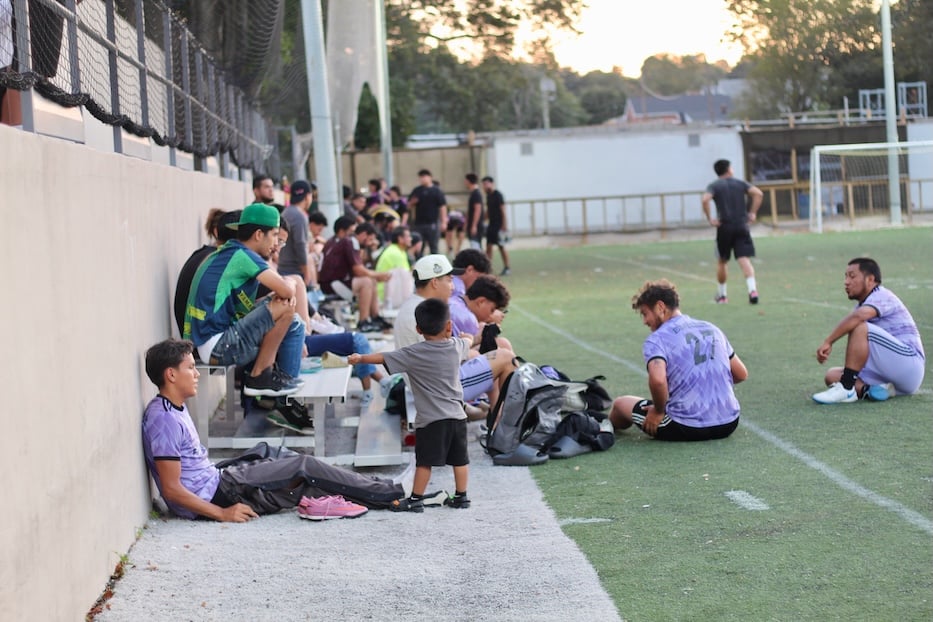
Still, complaints from neighbors started trickling in, usually bemoaning the presence of lights or the sound of whistles, which came from referees. A couple neighbors mentioned stray balls that had made their way into backyards, an issue Yanez said she dealt with immediately. Some felt more racially coded, she said: people ostensibly complained about “Texas plates,” which Sylvia took as a thinly veiled jab at the number of Latinos who play there, and the Mexican roots of the sisters who own the place.
But she and Brina persevered, she added: doing so felt like the only option, particularly when they saw how many community members loved the space. There were, for instance, popular options like a youth futsal clinic and a “Big Little Run Club,” where kids could come and get their energy out through running twice a week. There were turf leagues with players that competed passionately on the field, and then made friends with each other when they were off.
In July, the owners appeared before the Planning and Zoning Commission, requesting longer operating hours and expanded use of the space, including for “art shows, fundraising events, vendor events, mental health events, geared toward community togetherness,” according to the proposal. After a long and contentious meeting, the commission said that it would revisit the proposal in six months (read a PDF of the full minutes here), during a meeting in early 2026.
That meeting was not without tension: neighbors spoke out in force about their concerns that the property was incorrectly zoned, lodged bitter complaints "about the lights, noise and unsightly fence," and suggested that the complex affects their property values, according to meeting minutes.
One neighbor, Christine Machado, noted "whistles and trumpet sounds during the night beyond 11 p.m.," a claim that Sylvia Yanez pushed back against when asked over the phone. Donovan, who later attended a celebratory ribbon cutting at the space, opposed the extended hours, citing noise and light pollution complaints that he had received from the neighbors.
That time, Sylvia explained, gave the sisters a few months to continue clearing out a space in the back, where neighbors had complained about construction equipment and cars on a property that a tenant, Biancar Fencing, was renting from Yanez Enterprises. She assumed that she and Brina were on track for The Building Complex to thrive as a small business and a community hub, and felt good about revisiting the request for extended hours
“Since the meeting, we've just been trying to be good neighbors,” Sylvia said. “Last year, I went door to door trying to connect. I had doors slammed in my face. Neighbors spit at me. I've had a neighbor key my car. It's all been very very aggressive. I don't understand. We're running programs for the wellness of kids and families. They want somewhere to play and hang out with their friends. The hostility shocks me.”
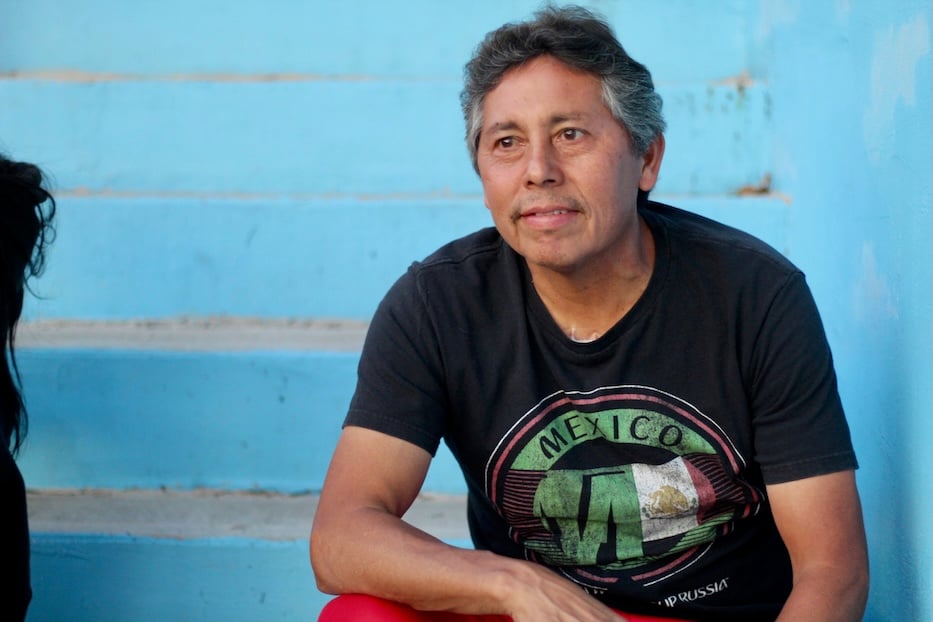
Victor Yanez, with the dream that started it all.
Then at the end of September, they received a notice of violation from the city, citing conditions of both the 2017 planning vote, when the property was under an entirely different LLC, and the 2025 commission meeting. They included speed bumps at the exit, proof of soil testing, and removal of equipment on the property—all issues Sylvia said she’s completed.
In addition, the letter—which said that the rear of the property was “being used as a Motor Vehicle Junkyard”—required that landscaping and parking plans be submitted to the city. Yanez, working with Branford-based architect Ronald E. Zocher, did so immediately, but said the city rejected them. In the meantime, she said, the team also filled and cleared three large dumpsters, and provided the city with proof that they had cleared more of the space.
City officials returned twice, once in early October and once on Nov. 4, to say that the violations were still in place. Daily fines have continued to roll in. Neither sister completely understands the timing: the city’s Planning and Zoning Commission asked for changes by January 2026, after that first meeting in July of this year. Why then, Sylvia said, are the violations starting in September?
“All we wanted to do is create a peaceful place for kids and families,” she said. “It's really just the neighbors pressuring the town to do unnecessary things.”
A Tight-Knit Family
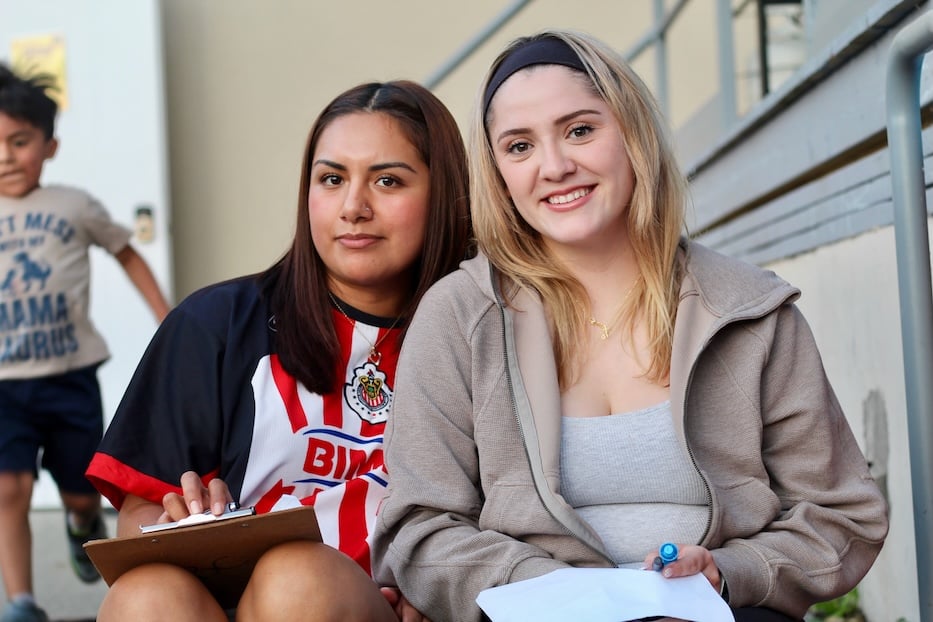
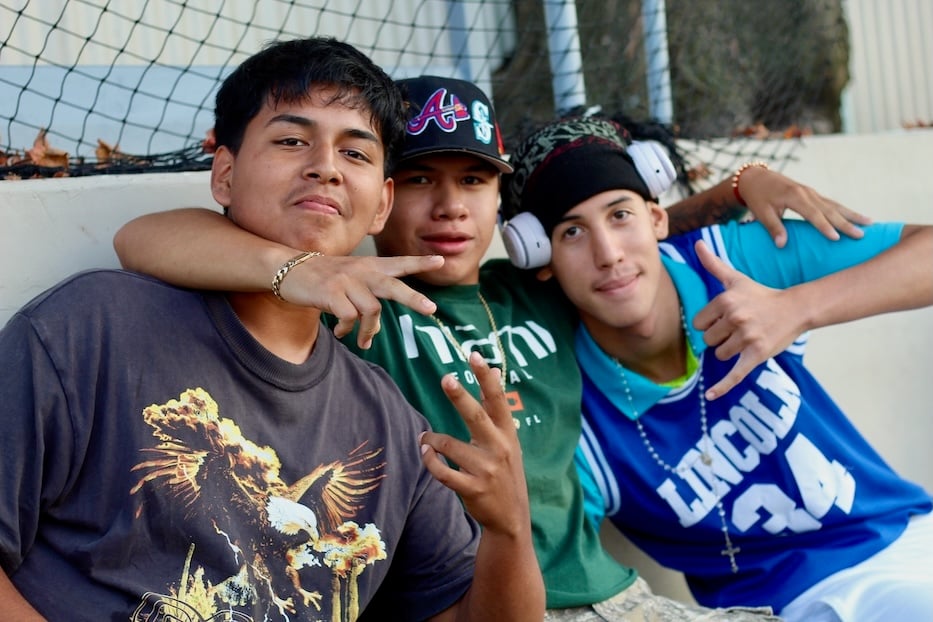
Meanwhile, games have continued at the space, outdoor leagues wrapping up their seasons as indoor activity increases for the winter. Currently, weekly futsal offerings—both leagues and clinics for youth, teens and adults—have popped up Monday through Thursday, starting at 6 p.m. and running through 8 p.m. Starting at the end of the month, players in an indoor co-ed volleyball league will take the court on Sundays.
“I feel like people like that they have a safe space where their kids can run around,” Brina said.
On a recent Thursday night, that love for community was fully on display, as turf leagues wound down their season with spirited games under a wide open West Haven sky, dusk just starting to appear as players criss-crossed the field. As he stretched by the bleachers, West Havener Danny Morales praised the space, which has given him not just a local place to play soccer, but a whole group of friends he never expected to find.
“The vibe here is great,” he said. “You have a lot of people who have the same interests as you.”
Across the field, striker Jean Yon tied his cleats and went into a low lunge. A student at CT State Gateway born and raised in Côte d'Ivoire, he remembered how excited he was to find the Building Complex after years of kickboxing. He’s still excited months later, as he forms friendships with the other players and flexes his soccer skills each week.
“It’s friendly,” chimed in Jeremy Biolin, who heard about the space when he was recruited to a league. “It feels more friendly than other places.”
Among players, chatter rose and fell —but it never became loud enough to hear from more than a few yards away. No one chafed at the trill of a referee whistle or the occasional call of “Hey!” and “Ref!” from the sidelines. Instead, players were eager to talk about how grateful they were to have a space to gather safely in community.
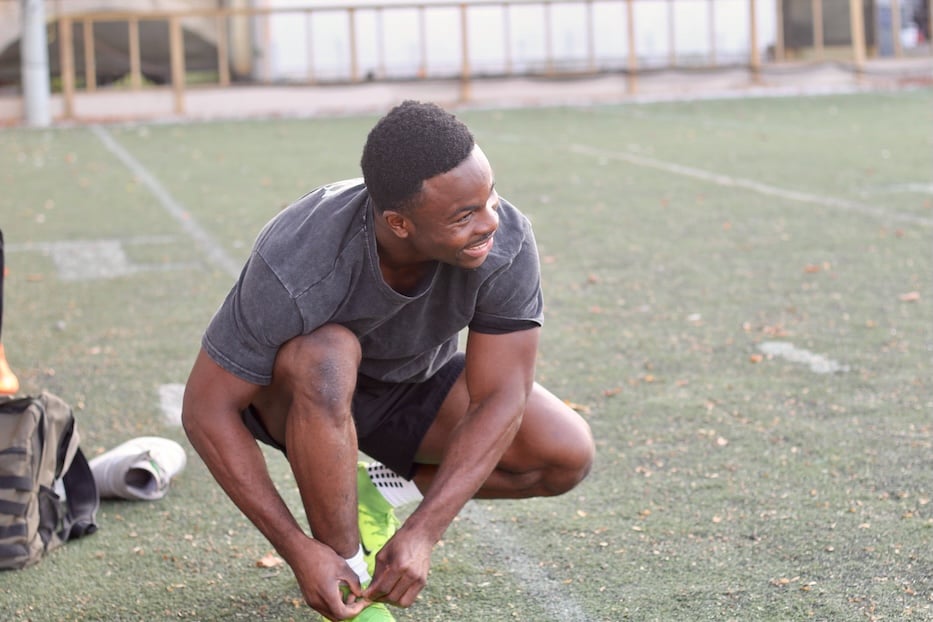
Meanwhile, that sense of family became a common refrain for almost every player who was interviewed, even as several took the turf field, and did their very best to defeat athletes alongside whom they had just been singing the praises of tight-knit community. Taiden Gonzalez, a student at the University of Connecticut who lives in New Haven, said that he’s fallen in love with the place since first hearing about it from a friend two years ago.
“The people, the community” are the most important part of the space, Gonzalez said. If the complex were to close—like many players, he’s stayed in the loop about everything taking place—it would be a huge loss to West Haven and to the athletes who rely on it, he said. “If it shuts down, it will be one less spot to go.”
He added that the Building Complex is also a place where people can practice mental-health and self-care: for many of the players, it’s the only form of stress relief they have in a busy life that includes family, work, and mounting finances as everything grows more expensive.
Midfielder Juan Najara, a junior at Wilbur Cross High School who described soccer as “everything,” noted how tight-knit the soccer community there has become. “Everybody knows each other,” he said. “It’s like a family.”
Victor Yanez, watching quietly from the porch, took a moment to soak everything in. When his daughters first approached him about taking over 150 Front Ave. and building out the turf field he had once imagined, he was thrilled. Now, it pains him to watch how hard his daughters must fight simply to ensure that the doors remain open to the community.
“It’s something that I dreamed of doing such a long time ago,” he said. “Thank God they’re working hard and making it happen.”

